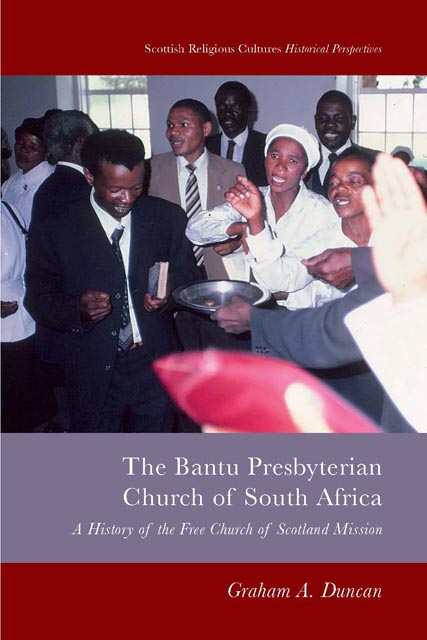Book contents
- Frontmatter
- Contents
- Acknowledgements
- Timeline
- A Presbyterian Anthem
- Introduction
- 1 Background to this Study
- 2 The Origins and Early Development of Scottish Presbyterian Mission in South Africa, 1824–65
- 3 Rev. Tiyo Soga (1829–71): A Paragon of Early Indigenous Leadership
- 4 The Role of Mission Councils in the Scottish Mission in South Africa, 1864–1923
- 5 The Rev. Edward Tsewu’s Dispute with the Free Church of Scotland Mission
- 6 The Mzimba Secession, 1898: A South African ‘Disruption’
- 7 Presbyterianism in South Africa, 1897–1923: To Unite orNot to Unite?
- 8 Preparations for the Formation of the Bantu Presbyterian Church of South Africa, 1897–1919
- 9 The Formation of the Bantu Presbyterian Church of South Africa, 1920–3
- 10 Mission to Church – Church to Mission: The First Ten Years, 1923–33
- 11 Reaching Out: The Bantu Presbyterian Church in South Africa and the Presbyterian Church of South Africa and Ecumenism, 1923–39
- 12 The Bantu Presbyterian Church in South Africa and Ecumenism, 1940–99
- 13 The End of Mission Councils: The Church of Scotland South Africa Joint Council, 1971–81
- 14 A Young Church in Mission or Maintenance Mode?: The Bantu Presbyterian Church of South Africa, 1923–99
- 15 The Bantu/Reformed Presbyterian Church and Socio-political Issues
- 16 Bantu/Reformed Presbyterian ChurchWomen in Leadership in Ministry
- Conclusion: Indigenous Presbyterians and Missionaries –Transferring Contending Roles and Responsibilities
- Bibliography
- Index
15 - The Bantu/Reformed Presbyterian Church and Socio-political Issues
Published online by Cambridge University Press: 26 November 2022
- Frontmatter
- Contents
- Acknowledgements
- Timeline
- A Presbyterian Anthem
- Introduction
- 1 Background to this Study
- 2 The Origins and Early Development of Scottish Presbyterian Mission in South Africa, 1824–65
- 3 Rev. Tiyo Soga (1829–71): A Paragon of Early Indigenous Leadership
- 4 The Role of Mission Councils in the Scottish Mission in South Africa, 1864–1923
- 5 The Rev. Edward Tsewu’s Dispute with the Free Church of Scotland Mission
- 6 The Mzimba Secession, 1898: A South African ‘Disruption’
- 7 Presbyterianism in South Africa, 1897–1923: To Unite orNot to Unite?
- 8 Preparations for the Formation of the Bantu Presbyterian Church of South Africa, 1897–1919
- 9 The Formation of the Bantu Presbyterian Church of South Africa, 1920–3
- 10 Mission to Church – Church to Mission: The First Ten Years, 1923–33
- 11 Reaching Out: The Bantu Presbyterian Church in South Africa and the Presbyterian Church of South Africa and Ecumenism, 1923–39
- 12 The Bantu Presbyterian Church in South Africa and Ecumenism, 1940–99
- 13 The End of Mission Councils: The Church of Scotland South Africa Joint Council, 1971–81
- 14 A Young Church in Mission or Maintenance Mode?: The Bantu Presbyterian Church of South Africa, 1923–99
- 15 The Bantu/Reformed Presbyterian Church and Socio-political Issues
- 16 Bantu/Reformed Presbyterian ChurchWomen in Leadership in Ministry
- Conclusion: Indigenous Presbyterians and Missionaries –Transferring Contending Roles and Responsibilities
- Bibliography
- Index
Summary
The legal enactments on African affairs during the 1950s amount to a frighteningly long list, including most importantly in regard to Church life: the Group Areas Act of 1950, extending residential and occupational segregation; the Bantu Education Act of 1953, whereby mission schools were taken from the hands of missions in order to produce more effectively an education ‘for Africans only (mission schools at various educational levels had for a century been fundamentally important for Africans); and the Native Laws Amendment Act of 1957, which brought apartheid to one of its ugliest consequences – the infringement of religious freedom.’ (Sundkler & Steed 2000: 821)
The mission of the RPCSA was expressed in its proud record of resistance to injustice, not only as a denomination but also because of individual and congregational commitment. The deliverances of General Assembly are often a poor guide to the actual process of resistance, yet they bear collective witness of the denomination to the struggle against manifest evils in society. The words of Rev. G. T. Vika, in his Moderatorial address, Whither Bantu Presbyterian Church? in 1974, may express more than the actual truth for that time: ‘Apart from a few Christian protesters in isolated cases the church has done nothing to improve the position of our unjust society’ (BPCSA 1974: 53). This was written in the context of ‘current events that pose a challenge to the Church in this country, and call for it to declare its stand in the face of what seems to be a church-state confrontation’. This resulted in the termination of the policy of sending ‘loyal addresses’ to the State President, regularly followed since 1923, due to them being remitted to the Department of Bantu Administration where they were simply filed.
The social justice issues focused on the matter of racial segregation, both official and unofficial, before 1948 when the Nationalist Party came to power and promoted its apartheid policy as official policy afterwards. This affected the church at large in various ways. Vika declared:
… Government continues, through legislation, to create more problems for us as the process of visas and permits through which workers from abroad have to pass is becoming more stringent by the day. (BPCSA 1974: 50)
This was a reference to the problems experienced in securing entry and reentry permits for missionaries and other foreign church visitors.
- Type
- Chapter
- Information
- Bantu Presbyterian Church of South AfricaA History of the Free Church of Scotland Mission, pp. 186 - 199Publisher: Edinburgh University PressPrint publication year: 2022



